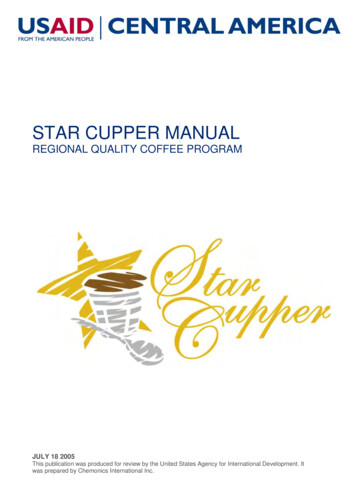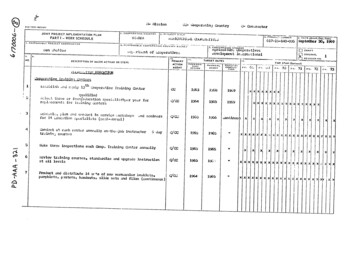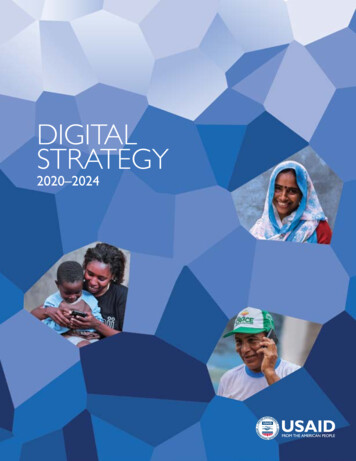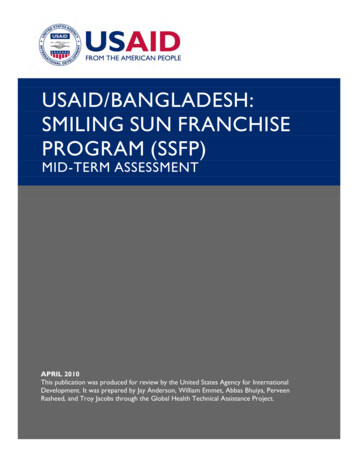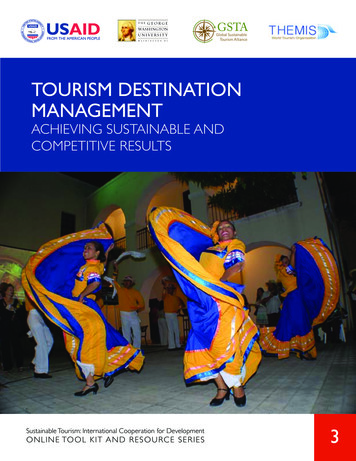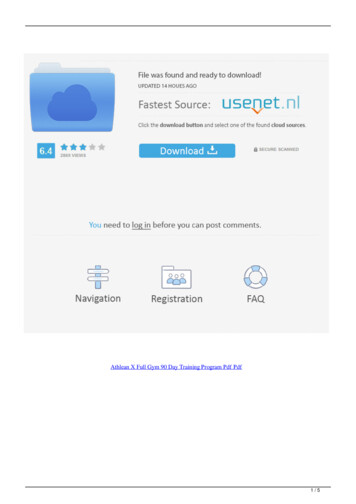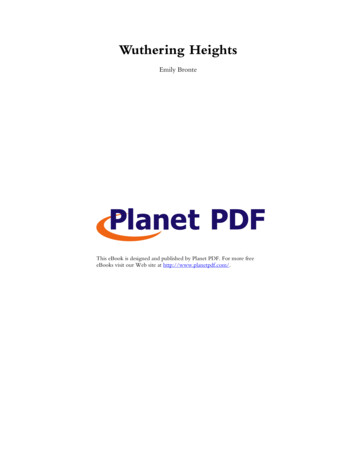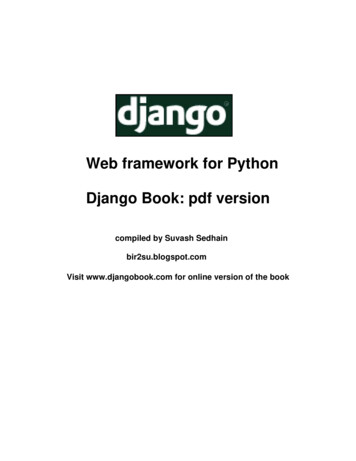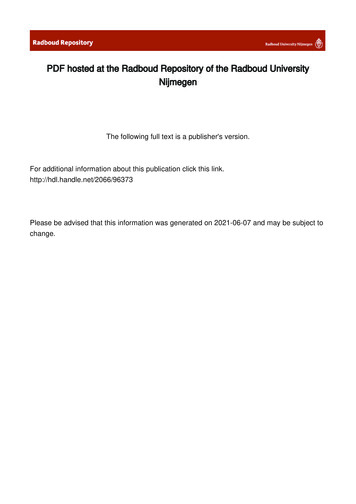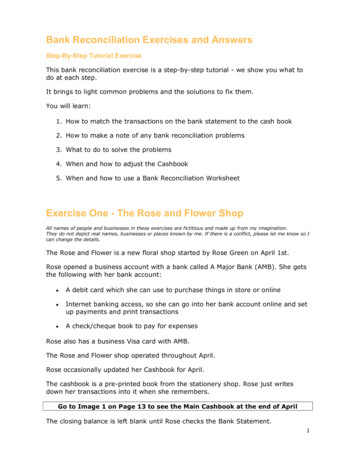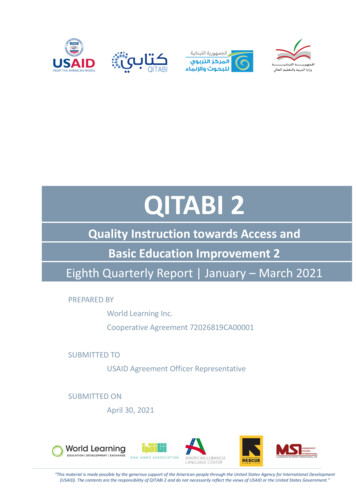
Transcription
QITABI 2Quality Instruction towards Access andBasic Education Improvement 2Eighth Quarterly Report January – March 2021PREPARED BYWorld Learning Inc.Cooperative Agreement 72026819CA00001SUBMITTED TOUSAID Agreement Officer RepresentativeSUBMITTED ONApril 30, 2021“This material is made possible by the generous support of the American people through the United States Agency for International Development(USAID). The contents are the responsibility of QITABI 2 and do not necessarily reflect the views of USAID or the United States Government.”
ContentsTable of Figures iiiTables iiiAcronyms ivQITABI 2 BRIEF DESCRIPTION vConsortium roles and responsibilities vRECOMMENDATIONS FOR IMMEDIATE ACTION IN QUARTER 9 viiI.Executive Summary ixIntroduction ixIMPLEMENTATION THROUGH AdaptATIONS xProgress by Outcome xOutcome 1: Improved Student Performance in Reading/Writing (Arabic, French, and English)and Math xOutcome 2: Improved Social and Emotional Learning xiOutcome 3: Improved National Level Service Delivery of Education xiPrivate Sector Engagement (PSE) xiiOperations and Finance xiiMonitoring and Evaluation xiiCommunications xiiChallenges, Constraints and Responses xiiII.Progress by Outcome 1Outcome 1: Improved Student Performance in Reading/Writing (Arabic, French, and English)and Math 1Output 1.1: Teachers deliver evidence-based instruction in reading and writing 1Output 1.2: Educational materials and equipment are being used in the classroom 15Outcome 2: Improved Social and Emotional Learning 19National Social Emotional Learning (SEL) Framework 19Output 2.1: Teachers adopt methodologies that promote SEL in the classroom 20Output 2.2: Schools adopt mechanisms that promote the engagement of caregivers in theirchildren’s learning 25Outcome 3: Improved National Level Service Delivery of Education 26Output 3.1: Technical and administrative support provided to CERD and GDE based oninstitutional capacity assessment 26Output 3.2: Learning agenda set for the modernization of Lebanese curriculum 29ii
III.Monitoring, Evaluation, Research and Learning and Communication 33MONITORING, EVALUATION, RESEARCH AND lEARNING (MERL) 33Collaborating, Learning and Adapting – Adaptive Management 33COMMUNICATIONS 40Communication Material 40IV.Financial Management and Operations 44V.Challenges, Constraints, and Responses 48Challenges at the Level of Program Implementation 48VI.Scope of Work for Next Quarter 50VII.Result Indicator Table 1VIII.Annexes 1TABLE OF FIGURESFigure 1: 6 IOs as Per the E-lesson StructureFigure 2: Structure of an IOFigure 3: QITABI 2 Phases of Online Material DevelopmentFigure 4: Arabic Onlne Material Sample From the Content Chucking-LS1Figure 5: QITABI 2 Model elements of Formative Assessment in e-lessonsFigure 6: SEL Framework ProcessFigure 7: the Different Phases of the Video Production Process2356142022TABLESTable 1: Capacity Building to QITABI 2 Learning FacilitatorsTable 2: QITABI 2 emergent Reader E-kit (Grade 1-3) Summary TableTable 3: Production Teacher Resources (Information Object)Table 4: Number of Schools receiving Boxes by End of MarchTable 5: SEL Integration into CERD LessonsTable 6: SEL SKills Domains And constructsTable 7: The Status of the Videos of the DOPS Key Parental Awareness MessagesTable 8: QITABI 2 Context IndicatorsTable 9: Tools/Templates developed/enhancedTable 10: Distance Learning MonitoringTable 11: Youth Engagement CLA Sessions in Q8615161721212533373839iii
MSINYUPIAPPITBPSEQITABIRCRSELSIUDLUSAIDWLAna Aqra’Advisory GroupAmerican Language Learning CenterAdditional Learning ObjectivesAgreement Officer RepresentativeBalanced Math ApproachCenter for Educational Research and DevelopmentCapacity Needs AssessmentDepartment for International Development (UK Government)Director of Finance and OperationsDistance LearningDistance Learning InitiativeDigital Learning ObjectDistance Learning PlatformDepartment d’Observation Pedagogique ScolaireDirector General of EducationEarly Grade Mathematics AssessmentEarly Grade Reading AssessmentGeneral Directorate of EducationHuman Institutional Capacity DevelopmentHolistic Learning ApproachInformation ObjectInternational Rescue CommitteeJoint Academic DepartmentLearning FacilitatorLearning ObjectiveLearning SequencesMonitoring and EvaluationMinistry of Education and Higher EducationMinistry of FinanceManagement Systems InternationalNew York UniversityPerformance Improvement Action PlanPre and In-service Training BureauPrivate Sector EngagementQuality Instruction towards Access and Basic Education ImprovementResource Center RepresentativesSocial Emotional LearningSocial ImpactUniversal Design for LearningUnited States Agency for International DevelopmentWorld Learningiv
QITABI 2 BRIEF DESCRIPTIONThe United States Agency for International Development (USAID)-funded Quality Instruction towardsAccess and Basic Education Improvement 2 (QITABI 2, March 31 2019–March 30 2024) aims to ensurethat girls and boys in Lebanese schools gain essential skills in reading, writing, math and social andemotional learning according to their development potential. The project is led by World Learning (WL),and includes partners Ana Aqra’ (AA), American Language Learning Center (ALLC), International RescueCommittee (IRC) and Management Systems International (MSI).QITABI 2 will build the Lebanese education system’sinstitutional capacity for sustainability and self-reliance.The project will seek to improve the provision ofeducational services specifically in reading, math, writing,and social and emotional learning (SEL) skills of girls andboys in Lebanon. Initially, QITABI 2 will target over 338,000students from 887 public primary schools in Lebanon,including those registered in 320 second shifts schools 1and 100 private schools, and will devise a plan tostrategically engage with the private sector at differentpoints and different levels of the project. Within both thepublic and the private sectors, QITABI 2 addresses threespecific outcomes: QITABI 2 THEORY OF CHANGEIf teachers acquire effective reading, writing, andmath instruction skills per the Lebanese nationalcurriculum and in line with international bestpractices;If teachers adopt methodologies that instill SELskills in students;if parents are engaged in their child’s learning; andif government institutions are empowered todevelop, implement, and monitor policies andcurriculum and enable teacher capacity tosuccessfully support students to achieve learningoutcomes;then teachers will deliver high-quality instruction,and students in primary public and private schoolswill acquire reading, math, and SEL skills accordingto their development potential and within asustainable educational system fostered bygovernment’s journey of self-reliance.Outcome 1: Improved student performance inreading, math, and writingOutcome 2: Improved Social and EmotionalLearningOutcome 3: Improved national-level service delivery of educationCONSORTIUM ROLES AND RESPONSIBILITIESPartnerWorld LearningQITABI – 2 Responsibilities Consortium lead: in charge of communications with USAID, primary point ofcontact with stakeholders, GDE and CERD Leads on Outcome 3: Improved national-level service delivery of education Leads English related reading/writing instruction material development andtraining Leads Numeracy/Math instruction material development and training Supports Arabic and French related reading/writing instruction materialdevelopment, training, national assessment, and benchmarking Field Team Lead: Mount Lebanon & Beirut - 208 (1st shift schools) including 101(2nd shifts schools)1Based on 2018-2019 datav
PartnerQITABI – 2 ResponsibilitiesInternationalRescueCommittee (IRC) Leads outcome 2: Improved social and emotional learningAna Aqra Association(AA) Leads Arabic related reading/writing instruction material development, trainingAmericanLebaneseLanguage Center (ALLC) Leads French related reading and writing instructional material development,training Field Team Lead: Akkar, North Lebanon, Baalbeck/Hermel, Beqaa - 473 (1st shift)including 173 (2nd shifts) Field Team Lead: South Lebanon, Nabatieh - 206 (1st shift) including 56 (2ndshifts)Management SystemsInternational (MSI) Lead partner: student assessments, SEL assessment, classroom observation dataanalysis, benchmarking and CERD capacity building in assessmentResource Partners Arcenciel: Lebanese NGO for inclusion education activities Lebanese American University: Research on gender and teachers’ self-efficacy New York University: Develop teacher/classroom observation tools to measurequality of instruction and SEL; scientific support for curriculum modernizationlearning agenda World Reader: Increase number of books available in digital formatvi
RECOMMENDATIONS FOR IMMEDIATE ACTION IN QUARTER 9ActionIssuance of VAT Exemption StampJustificationComments/ ResponsibilityApproval of QITABI grant by the Government World Learning to followof Lebanon was published in the official up with MOFgazette on March 25, 2021, ensuring that theassistance provided by the project is exemptfrom Government taxes and customs duties.The project submitted the grant acceptanceand the official gazette extract to the Ministryof Finance (MOF) to speed up the VATexemption request on March 11, 2021.Outcome 1Verify the HLA training materialwith CERD and DOPS to launchthe training of trainers andcoaches in preparation for rolloutto teachersCERD and DOPS need to endorse the training World Learning – AA – ALLCmaterial to start the implementation of HLA- CERD - DOPSImplement the Learning RecoveryStudyThe study will provide critical information for World Learning – AA - ALLCthe coming academic year back to the school – MSI CERD and DOPSplan after the COVID-related schooldisruptions.Conclude the procurement ofClassroom MaterialTo distribute the classroom materials to the World Learning – AA - ALLCschools before next quarter, the procurementof classroom material for all grades 1 to 6 inpublic primary schools need to be finalizedand contracts with selected vendors need tobe signed.Outcome 2Conclude the contextualization ofPriority SEL Competenciesthrough qualitative researchThis is essential to inform the development ofthe SEL formative assessment tool.World Learning- DOPSCERDLaunch SEL teacher foundationalcourse with CERDSEL teacher training material and PSSactivities need to be finalized to supportCERD’s post-COVID-19 school plansWorld Learning – IRCOutcome 3vii
ActionJustificationComments/ ResponsibilityComplete the HICD assessment of It is critical to conclude the HICD assessment World Learning – CERDactivities (Workshop, Focus Group, andthe CERD - PITBInterview) for CERD – PITB to identify CERDneeds in terms of resources and equipment forteacher trainingOperationalize the HICDrecommendations for CERD ERBand EIMSB and devise acommunication system for PIAPimplementationPiloting the implementation of a PIAP World Learning – CERDrecommendation will inform the developmentof communication and coordination systemfor PIAP implementation with CERDManagementComplete the HICD Assessmentat MEHE-GDECompleting the HICD assessment with MEHE- World Learning - MEHEDGE will inform the planning for supportingsystem strengthening at the MEHE-DGEImplement interventions withfaith-based charity associationsto support underprivilegedschools and students for theacademic year 2020-2021To support students for the current academic World Learningyear, the project will conclude efficiently theprocurement of education boxes for around25,000 families/40,000 students and launchDL training for around 500 teachers with thesupport of trained “teacher trainers”.viii
I.Executive SummaryINTRODUCTIONAt this delicate juncture, Lebanon faces its worst and hardest depression ever since the end of theLebanese Civil War. Lebanon struggles to survive on the brink of a total collapse, between streetprotests, COVID-19 pandemic, dangerous depletion of resources, protracted absence of a functionalcabinet, and overlapping economic, financial, and social crises. Despite decades-long rate of 1,507.5LBP to the dollar, the informal black-market value of the USD is now around 12,000 LBP, which points tothe national currency’s fading value. More Lebanese are slipping into poverty as the currency lost 90percent of its value, and Lebanon’s average inflation rate soared to around 85 percent, with food pricesincreasing by five-fold.To add to that, COVID-19 significantly disrupted the country's economic stability and impacted allsectors, including the educational sector. By March 31, 2021, the number of cases in Lebanon reached468,400 in addition to 6,184 casualties. The vaccination process has commenced at a very slow pace,with only 1.4 % of the population fully vaccinated as of March 31, 2021. Due to the highest rise in viruscases during January 2021, the government of Lebanon announced a total lockdown.For the interest of students' health and their families, the ministry of education shifted from hybrid todistance learning, and schools remained closed except for administrative work. Moreover, on March 5,2021, MEHE’s minister announced that all education activities would come to a halt for one week(March 8 -12) to exercise pressure on the government to prioritize the vaccination and to receivefinancial support. Distance learning resumed normally as of March 15.Throughout this turbulent period, QITABI 2 team consistently continued delivering its planned activitiesfor FY2021 to support the Ministry’s and CERD’s initiatives, including the emerging CERD DistanceLearning Initiative and all its supportive activities. From the production of e-content for Arabic English,French, and Math to Distance Learning training of coaches, trainers, and rollout of training to teachers.Additionally, the project provided technical assistance to modernize CERD’s platforms, technologyservices, and 33 teacher training and resource centers.The project team clearly showed its agility by introducing new activities to inform the ministry's nextyear's planning post COVID-related school disruption. One such activity was the Learning RecoveryStudy, designed to inform the back-to-school plans to ensure that student academic, social andemotional needs are addressed when schools open their doors in 2021/2022 for in-person learning.Additionally, QITABI 2 held four induction meetings for primary public-school principals, in coordinationwith the ministry and the general directorate of education.The meetings provided a platform for the project to“QITABI 2 represents a light in theintroduce its next year’s plans to the principals and alloweddark tunnel that the country isprincipals to voice their challenges and opinions regardingcurrently going through”.their schools’ critical needs. A number of principals salutedA School Principal attendingQITABI 2 management and team for providing muchPrincipals’Induction Meetingsneeded support during these trying times.Moreover, in a first-of-its-kind initiative, the newlyappointed CERD President launched the Key Stakeholders Committee to enhance the coordinationbetween CERD and its three main partners/donors, S2R2 (funded by DFID and World Bank), QITABI 2,and UNICEF. The Key Stakeholders Committee is composed of four thematic subcommittees, (i) Digital,ix
(ii) Academic, (iii) Rehabilitation, and (iv) Training. This structure was devised by the CERD leadership tocoordinate the needed support and resources for the center in its curriculum revision plan that wasendorsed by the minister on March 30, 2021.IMPLEMENTATION THROUGH ADAPTATIONSIn Q8, the project team pursued monitoring the health situation, safety conditions, and thesocioeconomic status to inform planning for staff operation and project activities. Assessments of thestatus of connectivity in primary public schools and the use of the educational boxes distributed tostudents were completed, in parallel to the ongoing data collection of the Rapid Education and RiskAnalysis. The results of these assessment activities will support the design of interventions for thequarters to come.PROGRESS BY OUTCOMEOutcome 1: Improved Student Performance in Reading/Writing (Arabic, French, and English) andMathDuring this quarter, the project’s literacy and numeracy teams continued authoring the G1-G6 Teachere-lessons PowerPoints and student self-paced learning material including formative assessmentactivities. The development is based on a structured model that incorporates four elements: alignmentwith the national curriculum objectives, sharing objectives with students, tracking students’ progress,and planning evidence-based differentiated instruction. In coordination with CERD e-content focalpoint, the project team instituted a new sign-off process for this educational e-content. The process isengineered to collect comprehensive feedback and validate the e-content being produced through astandard communication tool called the “Bon a Diffuser”. This process establishes a new inter-bureaucommunication mechanism for the four stages of publishing digital content, (1) authoring content, (2)producing e-content for teachers and students, (3) evaluating e-content, (4) and publishing e-contentonline. The e-content receiving sign-off through the Bon a Diffuser document will be posted on CERD’sdigital learning platform and accessed by teachers and students across Lebanon.Following the submission of the HLA TOT resource guides to CERD for feedback and review, the firstdraft of the Arabic language teacher online course was completed with 5 Learning Sequences coveringkey foundational learning skills. A thorough analysis of the DOPS national competency framework wasperformed, and major gaps and areas for enhancement were identified; this will inform the resourceguide enhancement and training material development.In addition, QITABI 2 began preparations for the Learning Recovery Study to support the ministry incollecting important student performance data to inform learning recovery plans for the 2021-2022school year. The study intends to measure grades 2 and 3 students’ reading levels in the Arabic languageand to gather information on students’ learning continuity during school closures and social-emotionallearning (SEL) needs. QITABI 2 assessment specialists prepared the tools and questionnaires for thestudy and reviewed them with MEHE-DOPS. Additionally, the team started preparing for both virtualand in-person assessment modalities. The assessment starting date and mode are contingent upon thenational sanitary situation and the schools’ operational status in April 2021.QITABI 2 also completed a literature review on diagnostic assessment to inform CERD’s theoreticalframework for assessment. The document includes the main approaches to diagnostic assessment andprovides suggestions for diagnostic assessment activities that QITABI 2 can implement in collaborationx
with MEHE and CERD. The next steps for this activity are contingent upon MEHE-DOPS and CERDdecisions.In what relates to educational resources, the project team completed the development of the literacyeducational activities and games to be included in the Homeschooling kit including parental friendlyprompts and guidelines. The Homeschooling kit hard-copy form will reach all cycle 1 (Grades 1-3)parents/caregivers in 887 public schools to ensure that all parents have access to material that they canuse to support their children’s literacy and numeracy learning. The Kit’s design will be finalized nextquarter, and the Kits will be distributed as soon as MEHE and CERD grant validation.The desk review for WhatsApp as a tool for online learning in low resource communities was completed.An online pedagogical model based on Community of Inquiry (COI) was suggested for teachers inLebanon to adopt. Clear guidelines and performance indicators were also developed to monitor andmeasure the percentage of teachers who efficiently use WhatsApp as a distance learning tool forlanguages and mathematics teaching.Outcome 2: Improved Social and Emotional LearningThis quarter witnessed the commencement of the qualitative research data collection as part of thevalidation process of the National SEL Competencies Framework. This activity included (i) datacollection from private schools, (ii) re-launching of DOPS engagement for public school data collection,and (iii) finalization of the parental interview protocol.The project team also continued to support in integrating SEL activities in the e-lessons being developedfor Grades 1-6 students with short SEL activities that focus on the cognitive and emotional domains.Simultaneously, , eight PSS videos & 4-animated PPTs were produced and cleared by CERD.In parallel, QITABI 2 SEL team advanced on: Teachers’ PSS manual for PSS activities targeting cycles 1and 2 being developed in coordination with CERD; Prototyping of SEL and PSS videos; SEL Foundationalteacher training modules; Alignment of SSELP with the Ministry strategic direction; and Parentalengagement and multimedia campaign design.Outcome 3: Improved National Level Service Delivery of EducationIn Q8, and on January 20, 2021, QITABI 2 launched the HICD assessment for MEHE-GDE by conductingan HICD induction/awareness Session for the senior team, and on March 30, 2021, held the first HICDinterview with the Director-General of Education to initiate the data collection process for the GeneralDirectorate of Education’s management processes.Additionally, the project team received an official email from the Head of EIMSB indicating thatdeveloping a D-Space system to centralize CERD’s digital resources is their new PIAP priority.Accordingly, the project launched the enhancement of the CERD D-Space activity. -.Moreover, the team finalized the development of the JAD HICD Report documenting the findings andthe recommendations at the management, primary, and support levels and focusing on JAD’s vital taski.e., the development of the National Curriculum with SEL integration.Moreover, QITABI 2 launched HICD for CERD’s Pre and In-service Training Bureau (PITB). Two HICDinterviews were held with the head of PITB to obtain data about PITB’s management, primary (Training),and support processes. After conducting the third HICD event on March 12, 2021, the project teamfinalized the first draft of a cross-functional Training process map.xi
PRIVATE SECTOR ENGAGEMENT (PSE)This quarter, the project met with the heads of the low-cost faith-based associations on January 5, 2021,and March 15, 2021, to follow up on achievements and progress to date. The project vetted and signedMOUs with 11 faith-based associations. Additionally, QITABI 2 launched the rollout of teachers’ distancelearning training for eight associations and completed round 2 preparation for the Training of Trainersof the three newly joined associations. Data collection for the education boxes activity is ongoing, andfinalization of procurement and dataset is expected by the end of next quarter.OPERATIONS AND FINANCEQITABI 2 established standards for regular reporting to the government of Lebanon including thequarterly Income Tax reporting, VAT annual reporting, and monthly Social Security reporting andsettlement. All payments were submitted on time to the Ministry of Finance and the National SocialSecurity Fund, in coordination with the Accounting/Audit Office.MONITORING AND EVALUATIONDuring this quarter, the MERL team continued to monitor the operating context to feed the projectadaptive management plan. The team completed the RERA data collection and finalized the Learningagenda. Two assessments were designed and shared with MEHE for input and facilitation. Namely, theschools' connectivity assessment and educational box assessment which were completed by end ofquarter. The results of the assessments will feed into the programming of activities in FY 2021.Based on Social impact (SI) guidance, the MEL plan was revised to include Youth 1 indicator. The projectteam submitted the revised MEL plan on January 1 and received AOR’s approval on February 3, 2021.COMMUNICATIONSThis quarter, QITABI 2’s communication team documented the 2nd phase of the education boxdistribution through engaging videos, photos, and online posts. Additionally, the team developedsuccess stories highlighting the project’s key activities and their impact, namely the education boxdistribution and the Distance Learning training to CERD’s academic experts (JAD). Additionally, theproject team continued enriching its YouTube channel with daily postings of videos for students,teachers, and parents.CHALLENGES, CONSTRAINTS AND RESPONSESThroughout this quarter, QITABI 2 continued to respond, adaptively, to the arising challenges, mostimportantly the health crisis and schools’ closure with their respective implications on the variousproject activities. The team is focusing on designing interventions in preparation for the next academicyear 2020-2021 in collaboration with MEHE and CERD.xii
II.Progress by OutcomeOUTCOME 1: IMPROVED STUDENT PERFORMANCE IN READING/WRITING (ARABIC, FRENCH,AND ENGLISH) AND MATHOutput 1.1: Teachers deliver evidence-based instruction in reading and writingDeveloping Training & Coaching Curriculum, Materials, & Tools to Improve Classroom Instruction inG1-6 Arabic, English, & French Reading/Writing and NumeracyLiteracy and numeracy “enhanced” curriculum mapsThe work on the literacy and numeracy improved maps is completed and will be discussed further withCERD upon the launching of the Curriculum Reform plan expected in Q9.DOPS coach Resource Guide & ToolsThis quarter, the QITABI 2 literacy team thoroughly analyzed the DOPS national competency frameworkand identified major gaps and areas that can inform the enhancement of the coaches’ resource guideand training material; the following areas have been identified to be included in the enhanced guide:(i)(ii)(iii)(iv)(v)(vi)Coaching teachers on best practices for a holistic approach to teaching,Communication approaches with teachers, subject coordinators, and school directors;Online coaching techniques and skills;Action research at the school level;Diagnostic, formative, and summative assessment.Enhancement of coaching tools.The team initiated the development of the material relevant to teacher coaching on HLA/BLA andintegrated the HLA elements in the revision of the classroom observation tool; the tool was developedunder QITABI (2015-2019) for Arabic classes.Next quarter, the team plans to finalize the technical revision of the guide by adding online coachingand performance indicators to align closely with the national framework.CERD trainer Resource GuideQITABI 2 enhanced the CERD trainer foundational resourceguides to include the QITABI 2 e-lesson structure. Thestructure of the QITABI 2 e-lessons embodies flexibility,allowing the use of the e-lessons in class, online, in blendedlearning, or as self-paced lessons.Each e-lesson incorporates a capturing asset (connectedness)and 6 Information Objects (IOs) (outlined in figure 1) alignedwith the national curriculum domains. SEL is integratedexplicitly and implicitly in every IO.Capturing Asset - ConnectednessAn activity that is located at thebeginning of a unit or a lesson. Thepurpose is to activate learners’ priorknowledge and provide them with somebackground information prior tostarting with the lesson.Information Object (IO)A complete session with all thecomponents of a mini-lesson.1
Listening comprehension & oral communicationIO1Reading comprehensionIO2IO3Phonics (cycle 1 mostly)/ Vocabulary strategy (cycle 2 mostly)IO4Reading fluency skillsIO5IO6GrammarWritingFIGURE 1: 6 IOS AS PER THE E-LESSON STRUCTUREEach of the IOs also follows a designed structure that incorporates elements of the HLA/ BLA model.1. Presentation of learning objectives in a childfriendly language3. Explicit presentation of SEL skill for the week in IO12. Circle time with reading, either read aloud (listening) orshared (read along)4. Additional implicit SEL activities and integration ofSEL throughout other IOs (placement varies)2
I DoWe doYou Do5. Mini-lesson
Apr 30, 2021 · World Learning Inc. Cooperative Agreement 72026819CA00001 . SUBMITTED TO . USAID Agreement Officer Representative . SUBMITTED ON . April 30, 2021 “This material is made possible by the generous support of the American people throu
